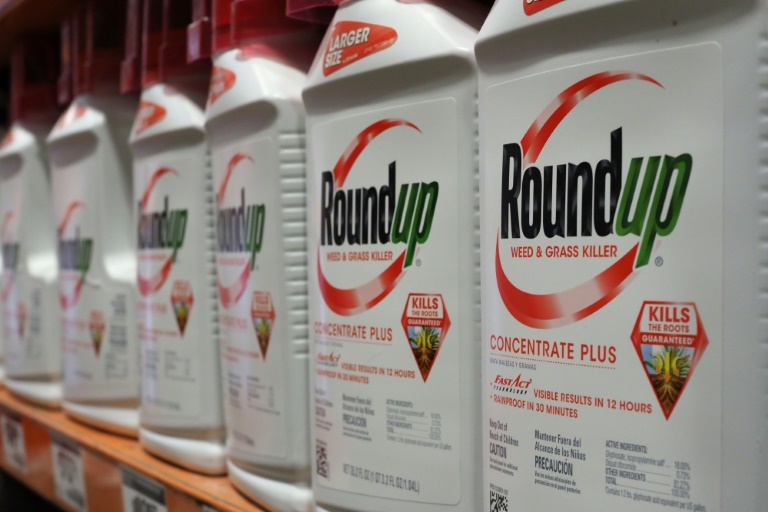
Monsanto could face massive losses if lawyers show in court that the company's herbicide Roundup caused a groundskeeper's lethal cancer (Photo: AFP)
A California man dying of cancer makes his case to a jury Monday in a trial against agrochemical giant Monsanto that could have sweeping ramifications.
Dewayne Johnson, a 46-year-old father of two, says he is sick because of contact with Roundup, the top-selling weed killer made by the chemical giant.
A California Superior Court jury in San Francisco on Monday was set to hear opening statements from opposing sides, with witnesses to follow in a trial over the potential link between the weed killer and Johnson's illness.
The stakes are high for Monsanto, which could face massive losses should a jury order it to pay out damages over the product.
Johnson used Roundup for two years from 2012 as a groundskeeper for the Benicia school district near San Francisco, his lawyer Timothy Litzenburg told AFP.
"A major part of that job was spraying Roundup or Ranger Pro (a similar Monsanto product)... He sprayed it 20 to 40 times per year, sometimes hundreds of gallons at a time on the school properties," Litzenburg said.
In 2014, Johnson was diagnosed with non-Hodgkin's lymphoma, a cancer that affects white blood cells. No longer able to work two years later, he filed suit against Monsanto, accusing the company of hiding the dangers of its product.
A key to Johnson's case will be convincing jurors that Monsanto's pesticide -- whose main ingredient is glyphosate, a substance some say is dangerously carcinogenic -- is responsible for the illness.
"His case has been expedited because he currently has only a few months to live," his lawyer said.
Litzenburg says he represents hundreds of people who also say they are victims of glyphosate.
Whether the substance causes cancer has been the source of endless debate among government regulators, health experts and lawyers.
Agent Orange
Monsanto, a company that is more than a century old, was recently acquired by German-based Bayer for more than $62 billion.
Founded in 1901 in St. Louis, Missouri, Monsanto made the artificial sweetener saccharin. The company began producing agrochemicals in the 1940s and now employs 20,000 people around the world and generates $15 billion in annual revenue.
Monsanto was one of the companies which produced a defoliant dubbed "Agent Orange," which has been linked to cancer and other diseases, for use by US forces in Vietnam, but denies responsibility for how the military used it. The company also made insecticide DDT.
Monsanto's flagship herbicide Roundup was launched in 1976.
The company soon thereafter began genetically modifying plants, making some resistant to Roundup.
The pesticide has been accused of damaging the environment, contributing to the disappearance of bees and being an endocrine disruptor.
The Roundup trial in San Francisco, which will directly address whether the product has caused cancer, is the first of its kind.
Scientific controversy
The International Agency for Research on Cancer, a World Health Organization body, has classified glyphosate, which is widely used around the world, as "probably carcinogenic."
The European food safety and chemicals agencies have so far not followed suit. A US Department of Health study has suggested its toxicity is limited.
Monsanto has always denied any link between disease and glyphosate, a substance classified as carcinogenic in the state of California, claiming that more than 800 studies have concluded that the product is safe.
"We have empathy for anyone suffering from cancer but the scientific evidence clearly shows that glyphosate was not the cause. We look forward to presenting this evidence to the court," it said.
Johnson has not specified damages he intends to seek from Monsanto, also known for its genetically modified seeds that have sparked intense controversy elsewhere.
"The only thing, as civil attorneys, that we can do is to take money from Monsanto and give it to Mr Johnson," said Litzenburg.
California law allows for an expedited procedure when a party is facing imminent death and Johnson's is the first targeting Roundup to use that law and reach trial.
Some activists see the trial as a potential watershed moment for the safety of chemicals such as pesticides.
"Monsanto has purposefully deceived the public about the safety of its flagship herbicide Roundup for decades," said Linda Wells, Midwest organizing director for Pesticide Action Network North America.
"If Johnson is successful at trial, it will be a huge shakeup for the entire pesticide industry."


